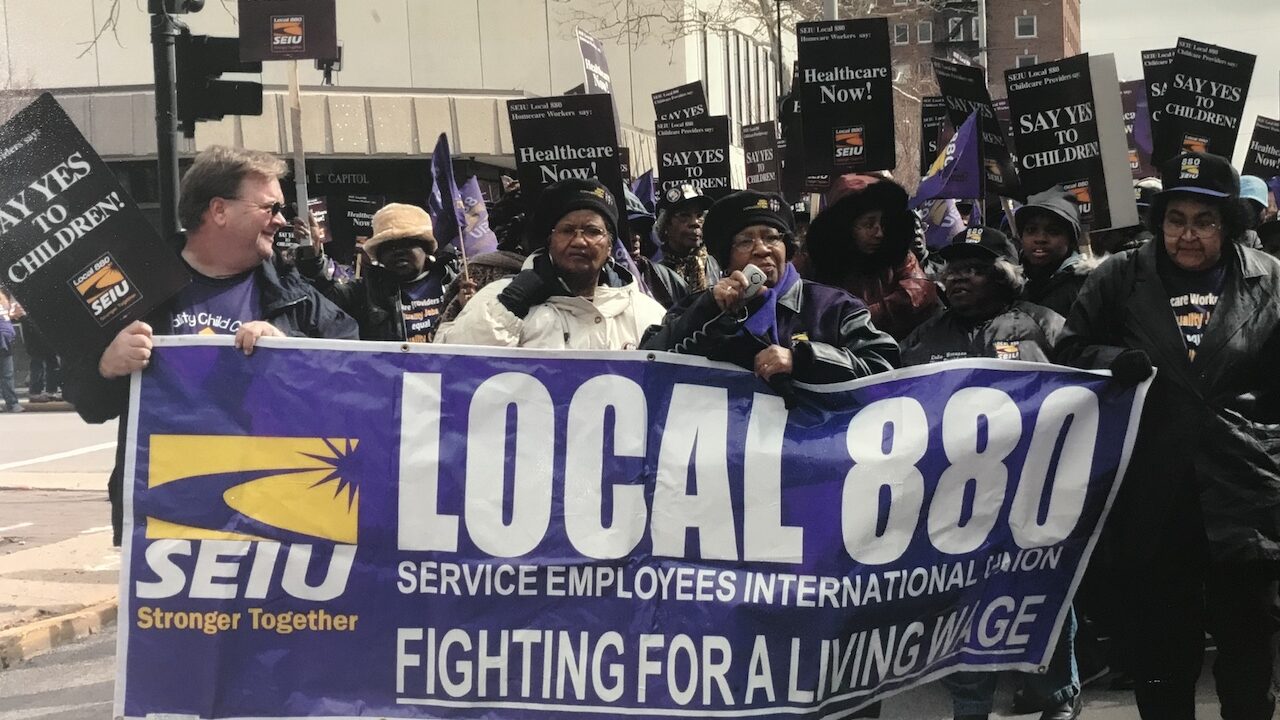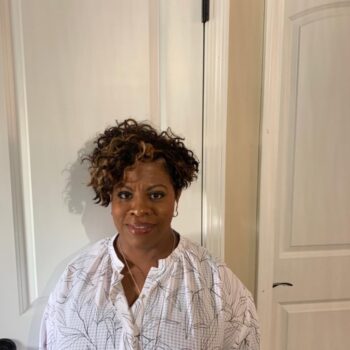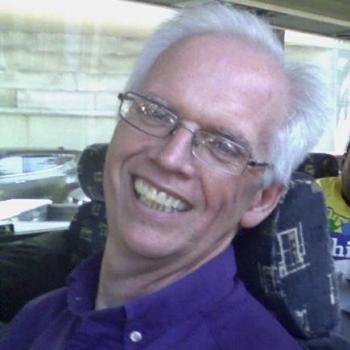One thing that the pandemic has shown us is that child care is essential, valuable, and skilled labor. But childcare providers have had to fight for basic labor protections and a decent wage. According to Child Care Providers United, the newly recognized union of childcare providers in California, “the median income for these providers is $12 an hour, but some licensed providers make as little as $5 an hour per child. Fifty-eight percent rely on government assistance programs to support their families.” Providers are overwhelmingly women of color and immigrants, and the state has failed to provide the support necessary to make childcare a living wage job.
Earlier this year, childcare providers and early childhood educators in California made history when they voted to form Child Care Providers United, a new union that will represent roughly 45,000 workers across the state. Their victory was the result of a 17-year effort led by three locals — AFSCME-United Domestic Workers 3930 and SEIU Locals 99 and 521 — with the support of community organizations. As Jovanna Hernandez, one of the organizers on the campaign, recounted, “This triumph was paved by a broad ecology of organizations, from Parent Voices to Local 1000 parent union workers showing up at the capital for our events.”
How did they do it? By organizing one provider at a time to build a powerful movement of workers who, despite not sharing a workspace or even an employer, came to see themselves as part of a community with shared challenges and aspirations.
This recent victory is the latest chapter in a long movement. In this interview, which has been edited and condensed, Keith Kelleher, the organizer who led the fight for the first childcare provider union in Illinois in the 1990s, talks with Pam Franks, a longtime childcare provider and organizer, about the early days of organizing childcare providers.
Read about the other interviews and articles in the series here.
KK: Tell me what kind of work you did before home child care.
PF: My first job was working in McDonald’s and fast food. I worked there a couple of years. When I worked there, I had challenges finding daycare. Especially in the area that I lived in. So, like I said, I had to send my daughter back to Arkansas to stay with her grandmother until I could get stable. Because I was so young, too. Then she came back to live with me. I worked as a bus monitor. And then I decided to open up a daycare. It was challenging because, by that time, I had two kids. Single mom with two kids. So it was a challenging thing trying to find daycare and go to work. So that’s why I decided to open a daycare. And back then, I could register before I got my license, I could register as a license exempt provider.
KK: What was it like working for the state in home childcare? What were the reimbursement rates, do you remember?
PF: I really don’t. I remember as a parent, I think it was, for license exempt, like $6 or something? When I came aboard as a [licensed] family childcare provider, I think it was like, maybe $12 for an infant. The system was just getting developed too. If you did have a problem, you didn’t know who to contact. There was no one to contact. You would call public aid, public aid would say call the child care office. Child care would say they’re not responsible for that. So it was just no accountability. You would keep kids and then end up not getting paid. And then you try to talk to childcare about it and nothing was done.
KK: I assume there was no paid training?
PF: Nope. I remember when I first started going, you had to pay for trainings. I think they were $5.
KK: There wasn’t health care?
PF: No, they didn’t have anything. I remember one day being at home and somebody door knocked me. And they was like, “We need a petition signed because we’re getting ready to start a union for home daycares through SEIU.” I came along after the first contract.
KK: Why did you decide to join the organizing drive?
PF: Well, I seen that, they got raises. I hadn’t. I might have seen a 25 cent raise from 1996 to 2000. When they established a union, we got our first raises, which was really nice. So that made me want to look into, “Hey, what’s a union? What’s it about?” So I contacted our local organizer. He came out and signed me up.
KK: And what did you do in the organizing campaign in your area after the first contract? Did you call people or visit them or anything like that?
PF: I remember going out to rallies. I remember doing some phone banking. I remember back then the union was on the north side of town somewhere. I remember that. And then I was a part of the second contract. But I was on an action team because I had small kids. So I couldn’t travel.
KK: What did you do then?
PF: Putting the word out. Talking to providers about what was going on with the contract. Talking to them about coming out and going to rallies. Talking to their legislatures. In 2011, a provider from Chicago called me and said, “You know we’re not getting paid.” I was like, “You all are not getting paid?” “Yeah, the state says they don’t have any money to pay us.” I was like, “Really? I never experienced this.” I never knew that the checks was connected to lawmakers, I never knew that.
KK: The state budget, all that.
PF: Right, it never concerned me because I was getting paid on time.
PF: So that’s when I was like, “I got to fight.” I contacted local newspapers and the news. SEIU, they helped me to establish a good message to get out.
KK: You did a communications training with the union?
PF: Yeah. I was really nervous. But if I don’t get on the news and tell provider and parent stories, who is going to do it?
I had my daycare on TV. They came into the daycare, they did a follow up story. We did phone banking. We got more providers involved, to let them know that we weren’t getting paid and how we got to fight.
We ended up getting paid three weeks later. But it opened my eyes to how to lead. I think the union just changed my whole way of thinking. Because I used to think about myself as a provider, not the whole system. Family, friends and neighbors are just as important. I didn’t think about them. But now, as years go, the union shifted me to think about the whole system and how it’s important to include the whole system. And how important for all of us to fight together.
KK: So everybody’s working all over the city, right? You’ve got all these different daycares. How did you go about building up the sense of community among them? Was it the phone banking, or was it other stuff you did? I saw on your bio that you helped organize some sort of collective of childcare providers in Springfield?
PF: I also had a history of working at Head Start. I like to share resources. So whenever I’m out, I’m talking about the union. Whenever I’m out, I’m talking about trainings or what’s going on with the union or how you can get involved or what does it mean to get involved. I always talk to anybody that I know in the childcare field. I build up our relationships with daycare centers, homes, through my classes. All the child development classes at college. I have relationships with center owners. Our second hit, when we experienced the childcare crisis, I was able to organize an event that no one else had seen in the childcare. I had 20 workers there. I organized it so that it fit the needs of the providers. So we do a speak out, we can feed the kids lunch at the park.
KK: Did you ever run into any problems with friends or family about the time you devoted to the organizing?
PF: As a single mom of three, it was trying to balance time between making sure that the kids was okay and the kids were getting their homework done. But with that being said, the union has worked with me to know my barriers, to work around my barriers.
As far as providers, at first I would get mad, like, “You’re not listening. You need to come out.” I had to learn how to organize, how to make what I’m talking about about their issues as well, to get them to want to come out.
KK: And how did you learn that? Did you learn that at the union training?
PF: Yeah, the union has really taught me great leadership skills.
KK: I know you said you came in after the first contract, but it took a long time to get the first contract. A lot of labor people didn’t even think we could organize a union of childcare providers. So, how do you sustain yourself and your contacts in these challenging fights? How do you maintain the possibility that you could win?
PF: It’s just having faith, and I have to surround myself [with] other union members that have the same drive and faith. I look at the union as a family. I have my board, that’s a family. I have my family in Springfield. And then I have my childcare providers with the E-board or with bargaining, different families. That’s what keeps my faith, just finding people that also have the same faith so we can build off each other.
KK: What was one thing that you would do differently if you were rerunning the organizing campaign?
PF: It was hard, when the union first started, to keep everybody connected. Because we have the whole state of Illinois. I still see a need for organizers in childcare that we don’t have. To connect more childcare providers and build that relationship up.
KK: What’s the most significant thing that you think you won over the years?
PF: Health insurance.
KK: What was it like for you before?
PF: I would just have to be sick. Or go to the emergency room and get a bill. And I couldn’t pay the bill because, you know, emergency, it’s high already. So it would hurt my credit because of the bill being turned in to credit. So, that was the most significant thing.
The union has helped childcare to become a profession, not a babysitter.
KK: They used to call them babysitters, right?
PF: Yeah. Don’t call me that now, though. I don’t sit on babies. I want to be called an early childhood educator. I educate children and their families. Starting off as a family childcare provider, you wouldn’t find any curriculum, any information, any resources. You would only find it, and the trainings were basically for center workers. It didn’t meet the needs of family childcare. So that’s another thing that the union has helped: to make [trainings] specifically for family childcare.
KK: Do you remember what the rates were before and what you get paid now per child?
PF: I was just looking at a check stub; I think it was back in 2003 maybe, and the rates was, for infant, it was $16. Versus now, we get, what, $35?
KK: Wow. So it’s two and a half times more.
PF: And that’s just now, we get a point two five percent raise throughout the life of our contract.
KK: In addition to the current $35, the new contract you just negotiated, it’s going to have a 25 percent increase over the next four years, is that what you’re saying?
PF: Uh-huh. This is the best contract we ever fought for and got. We got an extra million dollars for our training fund, so we got 2.5 million dollars. And our training fund is to help promote quality child care, mentor providers from one level of quality to the next. Get our license exempt providers that want to be licensed, help mentor them and coach them in becoming licensed providers.
KK: What is the biggest lesson that you’ve learned from all your union campaigns?
PF: That I couldn’t do it alone. If I go to the state capitol and I want a raise, they’re not going to listen to me. They’re going to think I’m crazy, if I’m out there screaming, “I want to raise!” We win in numbers.
We did get the state to agree to form two committees, joint committee to start talking about retirement, which is a big issue. That would be the next greatest thing.
KK: There’s no pension or retirement benefits now?
PF: No.
KK: So if you want to retire, you just have social security? Or do you even have that because you’d have to pay your own social security taxes, I’m assuming?
PF: Yeah, I still pay them through my income taxes, which is nothing. And I do have two ROTH IRAs. But they’re still not accumulating enough, and I’ve been having those for maybe about five years. But they’re still not accumulating enough that I could retire if I wanted to retire today.
So, at first, there wasn’t no stability in payments. Then, it started off, where’s your health insurance? What about your education? So we got all those in place. And we have a voice and contract behind us that makes the state accountable now.
Now we need something for our older pioneers that’s been in the field to be able to retire. And feel good about retiring.
This is not an easy job. As the years have moved, there’s more accountability for family childcare providers, more paperwork, more demands from the state, more demands from the food program. It’s not just sitting here putting the kids in front of TV. It’s a real learning environment.
And it’s hard. It’s hard doing it by ourselves. And with the money I make, I still couldn’t hire an assistant. Because I’d at least have to pay my assistant minimum wage, which I don’t even make yet. So we still have a long way to go with the state.
KK: How many children do you usually have in your center?
PF: Right now, I usually have about 12. Before and after school. Eight total by myself. But with the pandemic, we can only have 10 now.
KK: And do you just do day, or do you do night too?
PF: I only do days right now. I used to do nights but it was too much. I just couldn’t do both.
KK: Yeah, that would wear you down.
PF: Yeah, but you need the income. And with 12 kids, before and after, you have to pay your assistants.
KK: Is there anything else you’d like to say?
PF: I just love my union family. The union has really changed my way of thinking. It really built up my leadership and communication skills. And now I feel secure in what I’m doing. You have to do it. You have to be that leader, and you have to have people to follow you.


